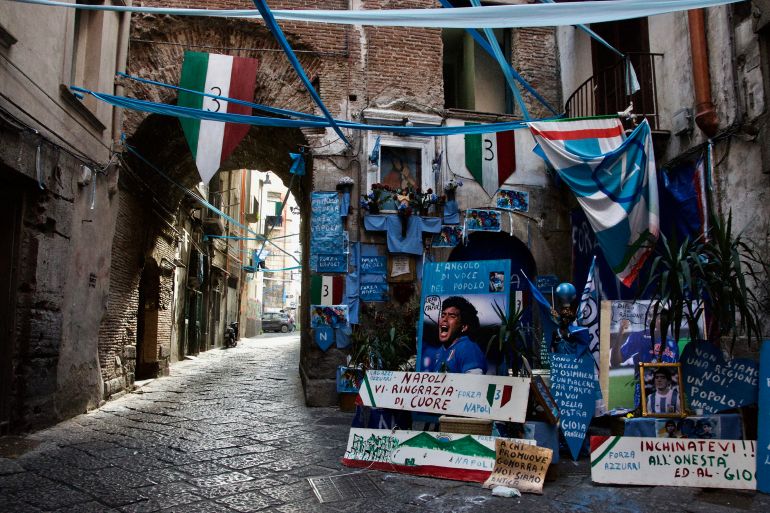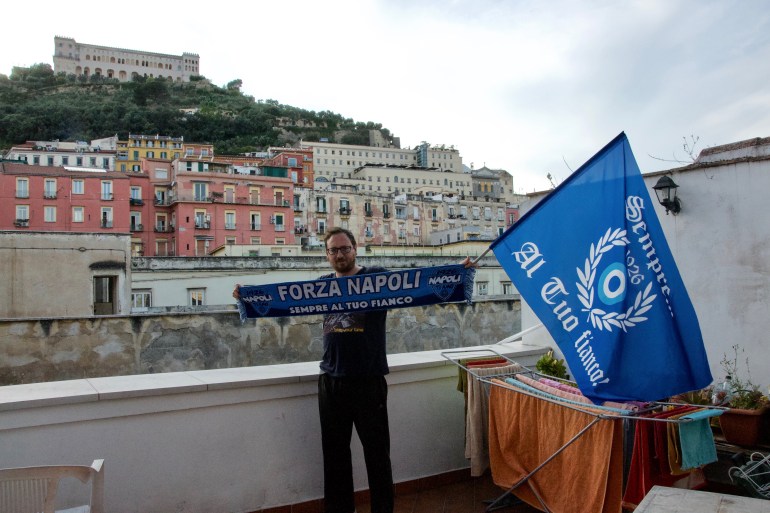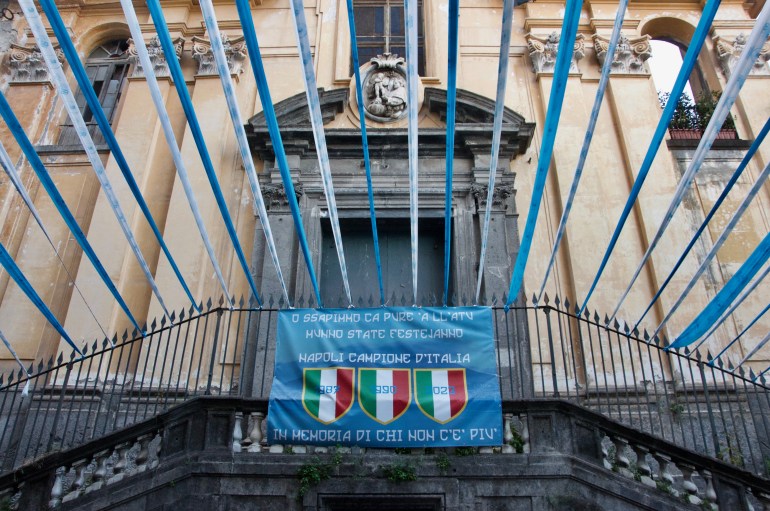Fever pitch as Napoli on brink of first Serie A title since 1990
For many Neapolitans, a first title in 33 years would symbolise much more than a beloved football team winning the league.

Naples, Italy – The streets of central Naples were quiet, except for the low murmur of TVs and radios all tuned to the same match: Juventus v Napoli. But as the game entered stoppage time, the pall was broken by a collective gasp followed by an eruption of cheers and whistles as Napoli scored to make it 1-0.
As Napoli closed out the victory last weekend, the rumbling of people jumping up and down in their homes could be heard, like a train passing though the city.
Keep reading
list of 4 itemsItaly’s football star Gianluca Vialli dies aged 58
Why were Juventus docked points and what happens next?
Inter Milan’s Lukaku sent off for reaction to racist abuse
The win means that if league leaders Napoli beat local rivals Salernitana on Sunday and second-placed Lazio fail to beat Inter Milan the same day, the Partenopei will win Serie A for the third time in their history and the first since Diego Maradona led them to the Scudetto in 1990.
Napoli fans swarmed the Capodichino airport to welcome the players back to Naples after the Juventus match, and many followed the team’s bus on mopeds and in cars as it made its way back to the stadium, offering a taste of what the celebrations would look like if Napoli wins the league on Sunday.
Absolutely astonishing view from the rear window of Napoli team bus at 3am when they landed back in Naples after beating Juventus at Turin.
After 33 years, Napoli next week can be crowned champions.
Incredible troop of motorbike following them pic.twitter.com/xKfbO1guzJ
— Tancredi Palmeri (@tancredipalmeri) April 24, 2023
In anticipation, residents of the city have filled nearly every street with flags, banners, and blue and white plastic ribbons that criss-cross between balconies. Some have repainted buildings and walls in the team’s colours.
Bakeries are selling blue and white bread, bars have introduced blue drinks and pastry shops are full of cakes adorned with the faces of Napoli players.
Across Naples, groups of people spontaneously erupt into Napoli chants. The city is in a state of tense anticipation for huge celebrations.
The municipality has already closed some streets to non-urgent traffic and has designated celebration points across several of the city’s biggest squares.
It is a situation that just a few years ago was unimaginable for Napoli fans. And for many Neapolitans, the celebrations will symbolise much more than a beloved football team winning a championship.
‘Tragedy after tragedy’
Andrea Bartolo, a 37-year-old office worker from the Spanish Quarters neighbourhood, told Al Jazeera of the pain that followed Maradona leaving the club in 1992 and the dark days that followed – including relegations and being forced to start again from Serie C1 after the club was declared bankrupt in 2004.
“After Maradona, it was just tragedy after tragedy,” Bartolo said. “People [in Naples] started to become fans of other teams because of how terrible the Napoli team was.”

This fall from greatness was particularly painful to Neapolitans after two league titles and a UEFA cup triumph with Maradona had brought not only footballing glory to the city but also a form of defiance and a rebuke to the discrimination and the social and economic problems the region faced.
Napoli has been targeted with chants calling for Mount Vesuvius to erupt and destroy the city; banners quoting Italian eugenicist Cesare Lombroso, who believed southern Italians were born criminals; and most recently an Atalanta fan who spat on a crowd of Neapolitans and called them ethnic slurs.
During press conferences, Maradona would speak out against the discrimination both he and Napoli faced when they played in the north.
“He was a symbol of the south, not just of southern Italy but the south of the world,” Bartolo said. “He single-handedly fought against the north.”
Bartolo said that a first Serie A title after more than three decades would be a vindication for a team and a city that is largely seen as an underdog.
“It’s like if a small, local store beat out a big company,” he said. “It would be a slap in the face to them, and it would show them that we are actually capable of great things.”
Napoli’s resurgence
Movie producer Aurelio De Laurentiis bought the club after bankruptcy and oversaw prudent investment, the smart recruitment of cheap but exceptional players, and the hiring of respected and experienced coaches.
Meanwhile, even when playing in the third tier, Napoli retained the backing of their large and passionate fanbase – breaking the Serie C attendance record with 51,000 fans at one match and often attracting higher attendances than most of the Serie A clubs.
Successive promotions brought them back to Italy’s top flight, and by the 2010-11 season, they were challenging for the title again and had qualified for the Champions League.
The progress has continued under Napoli’s charismatic current coach, Luciano Spalletti, who puts an emphasis on attacking, possession-based football.
Napoli’s Nigerian striker Victor Osimhen is by far the Serie A’s top scorer this season with 21 goals. He has created a rich partnership with Georgian winger Khvicha Kvaratskhelia, signed for just 10 million euros [$11.1m] from Dinamo Batumi. He is nicknamed “Kvaradona” for his skillset, which evokes memories of the Argentinian legend.
Napoli already made history this season by reaching the quarterfinal of the Champions League for the first time although they narrowly lost to fellow Italian giants AC Milan.
In the league, they have blown away all the competition and currently sit top by an incredible 17 points with seven matches remaining. It is only a matter of when, not if, they take the title.

Umberto Iannaccone, a 70-year-old resident of the historic centre, sits in a squat wooden chair in the middle of a shrine he has made to the Napoli team. Nestled between two historic buildings, his corner is plastered with blue and white posters of Napoli players and tiny cardboard cutouts with handwritten sayings. On one poster of Maradona, he has handwritten a speech bubble saying, “Out with the Mafia.”
Many Neapolitans still feel a profound sense of neglect and mistreatment by the state as the city has a poverty rate three times the national average, crippling youth unemployment of about 50 percent, and entrenched organised crime.
Although Naples has experienced a tourism boom over the past five years, the average resident has not seen much of an effect on their day-to-day life or job opportunities.
“Give us jobs, give us schools, give us opportunity,” Iannaccone said.
This feeling of abandonment is widespread among not just Napoli fans but also the city as a whole and is reflected in graffiti across the city with phrases like “Napoli is not Italy” or “We are not the brothers of the north.”
Hanging from a balcony on Iannaccone’s street is a Napoli flag made with a slight adjustment to feature the symbol of the Kingdom of the Two Sicilies which, prior to Italian unification in 1861, most of southern Italy fell under.
Street vendors and local stores alike frequently fly a Napoli flag featuring the symbol as a way to signify that football and the north-south divide are connected. Football is seen as a microcosm of the issues that Italian society faces, and when Napoli or other southern teams play northern teams, it is seen as a battle in both physical and metaphorical terms.
Football is one of the ways that Neapolitans are able to be proud of their city and their identity while escaping the troubles of their everyday lives for about 90 minutes.
“It’s a release of emotion. You can forget about your life for a little and just be in that moment,” Rosario, a 56-year-old mechanic, told Al Jazeera.
Meanwhile, Iannaccone says that becoming champions won’t fix Naples’ social, political and economic problems, but winning Serie A again after more than three decades would show that Napoli has been able to survive and thrive again in spite of all of its issues.
“When Napoli wins, we will all be unified under one flag to shake off all of the oppression and discrimination we have endured over the years,” he said.
“The people don’t have much, so let them enjoy what little they have.”
